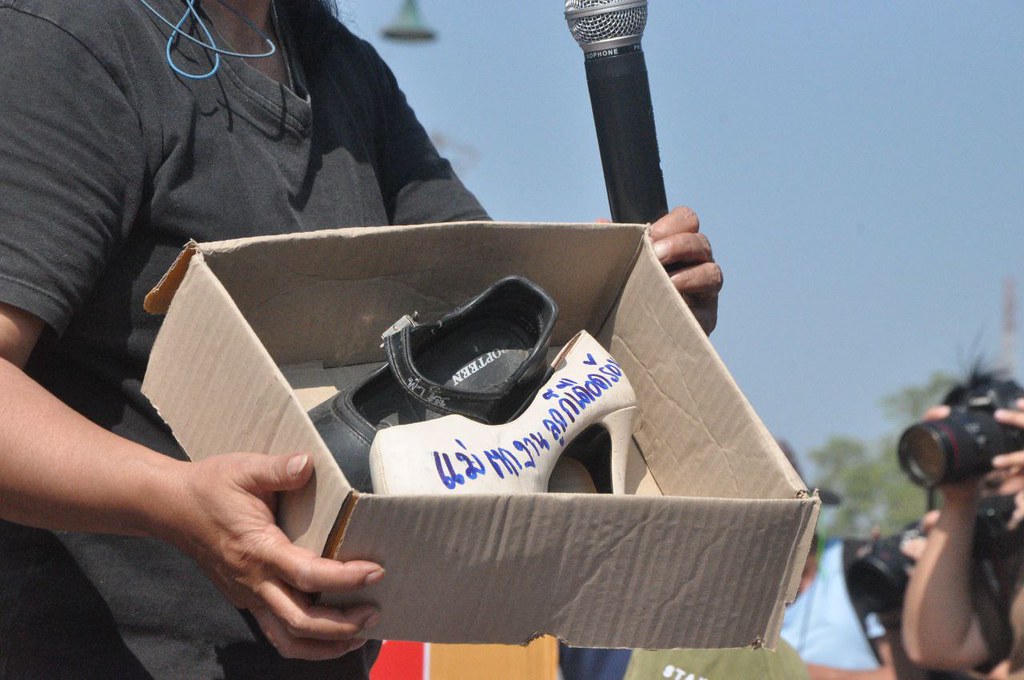Thai sex workers remain excluded from government assistance schemes, after the government ordered the closure of entertainment businesses to prevent the spread of Covid-19, causing many to lose their jobs and income.

High heels on display in front of Government House
At a demonstration in front of Government House on 22 December 2021, representatives from the Empower Foundation and sex workers from several provinces, including Chiang Mai, Chiang Rai, Bangkok, Pattaya, and Phuket, displayed packages containing high-heels previously sent to the government as part of the Empower Foundation’s campaign for government assistance for sex workers.
Sex workers from across the country had mailed their high heels, which they see as tools of their trade, to Government House to call attention to their grievance. But none of the parcels were accepted and all were returned to the Empower Foundation.
The parcels were displayed in front of the Bangkok Art and Culture Centre (BACC) on 21 December 2021 and were opened in front of Government House on 22 December 2021 to display the messages written on the shoes, which included “When will I get to go to work?” and “When a mother loses her job, her kids also suffer.”

A parcel containing a child's school shoe and a white high heel with the message "When a mother loses her job, her kids also suffer.”
Empower Foundation’s Thanta Laowilawanyakul said that entertainment businesses have been closed since the beginning of the pandemic in early 2020. During this time, sex workers have been excluded from government assistance schemes, while the authorities paid no attention to their demands.
Thanta said that the Foundation first sent a letter to the government on 20 April 2021 to call on it to provide assistance for sex workers and other service sector workers at 5000 baht per month per person until entertainment and nightlife businesses can reopen and they are allowed to return to work. The payment must also cover those on temporary contracts or paid at piece rates, as well as indigenous and migrant workers who may not be documented. They also held a demonstration in front of Government House on 29 June to follow up on their demands.
But Thanta said that the authorities had still not provided any assistance for sex workers. She said that sex workers and other service sector workers received assistance for only 90 days during the first wave of Covid-19 in early 2020, when they received around 15,000 baht from the government’s “No one left behind” scheme. They have yet to receive any assistance for the second and third waves, because requirements such as membership in the social security scheme or certification by a trade organization prevented them from accessing other assistance.

Empower Foundation representatives submitting an open letter to government representative on 22 December 2021.
The Empower Foundation also issued a statement saying that since the start of the pandemic in early 2020, entertainment businesses have been closed for a total of over 400 days, during which time sex workers received very little assistance. Meanwhile, the economic decline during the pandemic led to the closure of small businesses and loss of employment. The government’s management of the pandemic has also been slow and inefficient, while its various assistance schemes are inaccessible to many, including workers in some of the service sector, at least 90% of whom are not part of the social security scheme and some of whom are migrant or indigenous workers.
The government has extended the closure of entertainment businesses to 16 January 2022, and workers who were hoping to return to work now have to continue to suffer the effects. Many are in debt and no longer have any savings, while new jobs are increasingly hard to find.
The Foundation calls on the government to act on their previous demands and to come up with a concrete remedies as soon as possible.

The parcels were displayed in front of the BACC on 21 December 2021.
Meanwhile, former human rights commissioner Angkhana Neelapaijit said that the government does not see sex work as work but as shameful and criminal, ensuring that sex workers cannot access state welfare, such as the social security scheme and assistance in cases of unemployment, illness, or being unable to work for a living.
Angkhana said that the closure of entertainment businesses during the Covid-19 pandemic lost sex workers their income and, despite their demands, they have not received the same assistance as other sectors. She said that the government must keep its promise to leave no one behind, and everyone has the right to equal assistance and welfare from the government no matter who they are. The government should also follow the recommendations made by the UN Committee on the Elimination of Discrimination Against Women (CEDAW) and the UN Working Group on Business and Human Rights in order to protect sex workers from exploitation and guarantee that they are able to live in dignity and equality.
Prachatai English is an independent, non-profit news outlet committed to covering underreported issues in Thailand, especially about democratization and human rights, despite pressure from the authorities. Your support will ensure that we stay a professional media source and be able to meet the challenges and deliver in-depth reporting.
• Simple steps to support Prachatai English
1. Bank transfer to account “โครงการหนังสือพิมพ์อินเทอร์เน็ต ประชาไท” or “Prachatai Online Newspaper” 091-0-21689-4, Krungthai Bank
2. Or, Transfer money via Paypal, to e-mail address: [email protected], please leave a comment on the transaction as “For Prachatai English”
